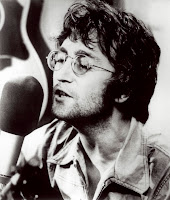"People seldom do what they believe in. They do what is convenient, then repent."
— Bob Dylan
 At risk of diving in over my head, I think I will start off my blog with a series on the role music has played in social agendas. It is an enormous subject, but has interested me for some time. If you look back on the 20th century alone, you may be able to call to mind any number of social movements or shifts in societal behavior. In fact, nearly every decade of the 20th century has its own defining events and social issues. For example, it is nearly impossible to reflect on the 1960s without remembering the Civil Rights Movement, or the 1920s without the Great Gatsby and the infamous speakeasies. What each of these movements also had was music that mirrored the philosophies and sentiments of the people who led them. John Lennon was a famous outspoken leader of the anti-war movement during Vietnam, and composed such songs as "Imagine" and "Give Peace a Chance," advocating for peace. Similarly, the 1920s are known for the emergence of dance hall music like ragtime, jazz and big band. The care-free, high energy mood of these new musical styles coincided with social behavior that earned the "Roaring Twenties" epithet.
At risk of diving in over my head, I think I will start off my blog with a series on the role music has played in social agendas. It is an enormous subject, but has interested me for some time. If you look back on the 20th century alone, you may be able to call to mind any number of social movements or shifts in societal behavior. In fact, nearly every decade of the 20th century has its own defining events and social issues. For example, it is nearly impossible to reflect on the 1960s without remembering the Civil Rights Movement, or the 1920s without the Great Gatsby and the infamous speakeasies. What each of these movements also had was music that mirrored the philosophies and sentiments of the people who led them. John Lennon was a famous outspoken leader of the anti-war movement during Vietnam, and composed such songs as "Imagine" and "Give Peace a Chance," advocating for peace. Similarly, the 1920s are known for the emergence of dance hall music like ragtime, jazz and big band. The care-free, high energy mood of these new musical styles coincided with social behavior that earned the "Roaring Twenties" epithet.
Music is the natural byproduct of humans living in the world and interacting with each other. So why should we be surprised when music becomes a tool to advocate for the things that we find important? It turns out that there are countless examples of this over the centuries, and I would like to highlight them in this blog series.
Because of my sunny and optimistic disposition, I choose to start with music at its best. In today's culture (contrary to popular belief) music is often used as a force for great good, persuading people to care about things that might otherwise go ignored. Many musicians are now using their concerts and albums to raise awareness for important social issues, and finding it to be a surprisingly effective tool. Music has emotional sway, thought-provoking and poetic lyrics, and perhaps most importantly, it carries with it celebrities who hold a staggering amount of money and influence. A recent high-profile example took place after the 2010 earthquake in Haiti, when George Clooney organized a fundraiser telethon called "Hope for Haiti Now." 130 of Hollywood's A-listers join forces to answer phones while musicians performed a free concert. It included performances by Beyonce, Justin Timberlake, Stevie Wonder, Bono, Taylor Swift, Bruce Springsteen, Alicia Keys, Coldplay, Sting, Madonna and others. (To see highlights of the performances, click here.)
Thanks to their musical talent (and star power), Hope for Haiti Now raised $58 million, for the aid of earthquake victims and the rebuilding of Port-au-Prince.
This kind of philanthropy is common amongst celebrities- some familiar names who are known for donating proceeds of their weath to charities are Gloria Estefan, Ricky Martin, Dolly Parton, and Barbara Streisand. But some musicians are going one step further by incorporating the social cause directly into the lyrics of their music. A British band called I like Trains formed their image around historical subjects, releasing their first album in 2006. But last month a local paper called the Evesham Journal reported that their newest album, He Who Saw the Deep, was inspired by climate change, and that the proceeds of the album would be donated to a D.C. based environment advocacy group called Friends of the Earth. Lead singer David Martin told the Evesham Journal,
"We wanted to change what we were doing and thought ‘what’s the obvious progression?’ And for us, it was to stop looking to history for inspiration and start looking to the future, to where we’re heading. I did a lot of research into the science of climate change and [our] new record reflects different aspects of that. I’d like to think as a band we’re all reasonably socially conscious. I’ve tried not to spell everything out, it’s a bit more cryptic and I’m not trying to preach. I’m just sort of documenting what’s happening or what could be happening."He added,
“A lot of people I’ve spoken to think that a musician talking about this kind of issue leaves a bad taste in your mouth. I don’t agree with that. I think that if a musician is in a position where young and impressionable people are listening to them, they should grab it with both hands.”(Click here to see the complete article online.) It is easy for all of us to say that we value the environment and want to stop global warming, but do we make sacrifices for it? I usually feel pretty good about myself if I carpool or recycle my soda bottles, but neither of those things cost money. Kudos to I like Trains for using their influence to encourage social responsibility, as well as donate considerable funds to an organization that might affect change in our environmental policies.
Another example can be found in the artist that was featured in my last post's song of the day. Brooke Fraser is a New Zealand born songwriter who had a quick rise to fame in Australia after the release of her debut album What to do with Daylight. Her fame came from writing teen-pop love songs that one might expect from a young star - but after visiting a child she was sponsoring in Rwanda, her music underwent a change. An interview (about 10 minutes total in length) on a Sunday morning Australian network documents her thoughts on songwriting, the Rwandan genocide, and what her role as an artist in affecting change.
Part 1:
Part 2:
Fraser uses the song Albertine to encourage us to take action against poverty, saying in the lyrics of her song,
Now that I have seen I am responsibleShe goes on to promise Albertine
Faith without deeds is dead
Now that I have held you in my own arms
I will not let go till you are
I will tell the worldFraser currently sponsors several children through World Vision, a non-profit agency that provides children around the world with nutrition, clean drinking water, health care and education. She has also been the face of World Vision in New Zealand since 2005, and has visited many countries on their behalf.
I will tell them where I've been.
I will keep my word,
I will tell them, Albertine.
And finally, today's song of the day is the music video for Brooke Fraser's song Albertine, for your viewing pleasure.
More to come!